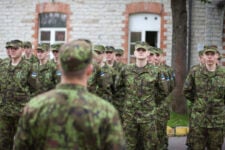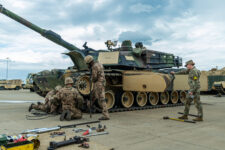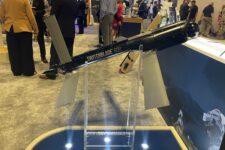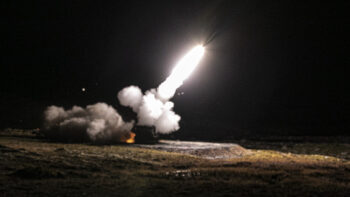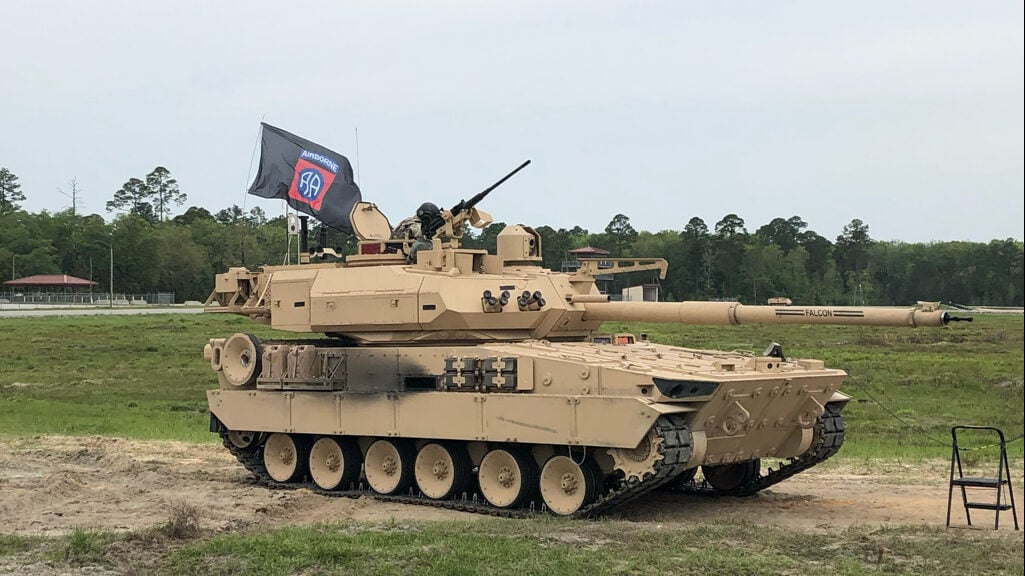
The Army awarded General Dynamics Land Systems a contract for its Mobile Protected Firepower light tank. (US Army photo)
UPDATED 6/29/2022 at 1:38 pm EST with comments from the two companies.
WASHINGTON: The US Army is awarding a $1.14 billion contract to General Dynamics Land Systems for its Mobile Protected Firepower program, the Army announced today, marking a significant milestone for one of the Army’s top 35 modernization priorities.
The Mobile Protected Firepower vehicle, which will be the Army’s first new designed vehicle in over 40 years, will provide the Army’s infantry brigades with a light tank for directing firepower against enemy positions and bunkers on the battlefield. GDLS beat out BAE Systems.
“This is our first big major platform that’s going from prototyping to production,” Doug Bush, the assistant secretary of the Army for acquisition, logistics and technology, told reporters on a media roundtable ahead of the announcement.
Under the contract, GDLS will be on the hook for 96 vehicles. The Army will buy 26 MPFs in the first lot, according to Brig. Gen. Glenn Dean, program executive officer for ground combat systems.
Maj. Gen. Ross Coffman, director of the Next Generation Combat Vehicle Cross-Functional Team, called the milestone a “big day” and an “additive capability” that fills a current gap for infantry units.
“The answer is in the name. It’ll gives the light infantry units a mobile, protected firepower that … can remove impediments on the battlefield to ensure our infantry women and men make it to the objective,” Coffman told reporters.
The Mobile Protected Firepower program is part of the Army’s Next-Generation Combat Vehicle portfolio, which is developing future ground vehicles as part of the services’ broader, multi-billion modernization effort that includes the Optionally Manned Fighting Vehicle.
The Army’s stated acquisition objective for the program is 504 vehicles. The first production vehicle will be delivered in “just under” 19 months, Dean said, a timetable that roughly hits around December 2023. That timeline is driven in part by the time it takes to get long-lead time parts, Dean said.
Moving into production, the Army and GDLS will have to be diligent to avoid supply chain issues as production ramps up. Dean said the program was already experiencing “challenges” in the supply base.
“We are seeing challenges in the supply base right now both in cost and availability [of] materials, as well as competition for other components, particularly in the electronic space where electronic chips are in big demand,” Dean said, adding the Army had “some comfort” because the proposals had “reasonable control” over their supply chain.
The first unit equipped milestone is on schedule for the fourth quarter of FY25, the Army officials said, with the initial requirement is one battalion of vehicles. Dean said one battalion is 42 vehicles.
The Army plans to field four battalions by 2030 with the “bulk” of the procurement fielded by 2035, Dean said. He added that the program had a total lifecycle cost of $17 billion across a 30-year lifespan.
The Army has had serious trouble with acquisition processes for new platforms in the past, including OMFV, currently on its third attempt to replace the Bradley Fighting Vehicle. Overall, Army leaders told reporters that they were satisfied with how the competition shook out.
“This achieved everything we were intending to. We had two vendors. They were competitive,” Dean said.
“We are honored that the Army has chosen our offering for this important program,” said Gordon Stein, General Dynamics Land Systems vice president and general manager for U.S. operations. “Our team worked tirelessly to deliver our prototypes in time to support the Army’s evaluation plan, and we incorporated Soldier feedback into the final design.”
In a statement, a BAE spokesperson said the company would use lessons learned from MPF to future efforts.
“We believe BAE Systems’ Mobile Protected Firepower solution would provide the capability the Infantry Brigade Combat Team needs,” a spokesperson said. “While we were not chosen to move forward in the MPF competition, we will take the innovation and lessons learned from our solution with us and apply it to future modernization efforts.”
BAE said it hadn’t made a decision regarding protests.
The Army’s fiscal 2023 budget request asked Congress for $356.7 million in procurement funds for 28 light tanks.
BAE and General Dynamics Land Systems were chosen by the Army in 2018 through a Middle-Tier Acquisition rapid prototyping contract worth up to $376 million each, with both contractors required to build 12 prototypes.
A soldier vehicle assessment began in January 2021 at Fort Bragg and ran for a year. BAE reportedly struggled to get its prototypes to North Carolina on time, but eventually its vehicle did make it. Still, Janes reported in March that BAE Systems had been eliminated from the competition.
Bush said that the Army would formally name the vehicles around the Association of the US Army conference in October.
Aloha: Fixes ongoing, then Army’s new watercraft prototype is Hawaii bound for testing
“Everything that we can knock off that list we will do in the archipelago…because that allows us to do the tests in the environment that the vessel will operate in ultimately,” said Maj. Gen. Jered Helwig.




